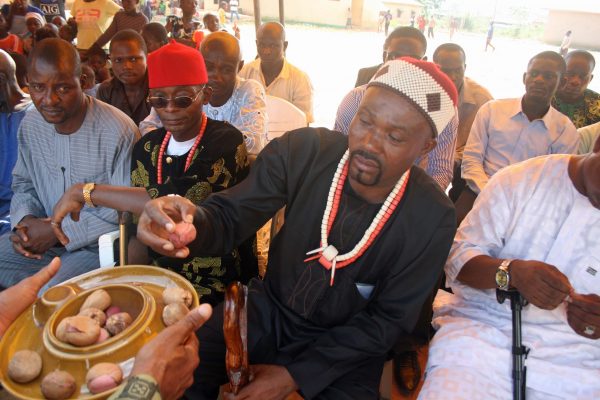The good people of Igboland hold the kola nut in high esteem. This fruit of the kola tree is important in the socio-cultural and religious life of the Igbo. Like yam which is the king of crops, kola nut is considered a man’s fruit. It is considered an abomination for a woman to plant, climb or pluck the kola nut tree. There are two main types of kola nut: Oji Igbo (Kola acuminate) and Oji Awusa (Kola nitida) popularly known as gworo. Oji Igbo is indigenous to Igbo land. It is at the centre of Igbo tradition.
In reviewing the symbolic uses of the kola nut in Igboland we discovered that:
1. Kola nut is a sacred offering in religious rites.
The kola nut serves a spiritual purpose in Igboland. It is used in prayers. Amongst the Igbo, the kola is the communication link between the living and the dead. In the ancient community of Aguleri, it is believed that when an elder takes up the kola nut, the gods and ancestors turn in his direction knowing that he has something to tell them. A typical Igbo man does not leave his house in the morning without first breaking kola nut. With the kola nut, he prays for life, good health, fruitfulness, protection and for good luck from the gods and his ancestors.
2. Kola nut is a symbol of acceptance.
The kola nut is always the first thing one has to present to a visitor. It is a symbol of goodwill and hospitality. The kola is considered a life affirming fruit in Igboland. It is generally believed that the kola is offered with a clean heart. As such, anyone who brings kola has no intention to cause injury or harm to the person whom it was presented.
3. The breaking of the kola nut marks the beginning of an event.
The place of the kola nut in traditional Igbo gatherings is not negotiable. It is the first and one of the most important cultural items presented to guests. Breaking of the kola is the equivalent of the opening prayer said in the gathering of Christians. The prayers made with the fruit define the purpose of the gathering. The breaking and sharing of the kola nut signals the beginning of an event.
4. Kola nut is a traditional symbol of unity and communion.
It is a widely accepted belief in Igboland that he who brings kola brings life. Kola nut is not an individualistic affair but a communal one. It is food to the Igbo man; a meal best enjoyed with company. The kola nut is a seed of togetherness, a force of unity, love, and peace. What is more, the Igbo belief in the strength in number is expressed in their utter rejection for the one or two lobed kola nut which is often thrown away. It is believed that the more the lobes of the kola, the more prosperity and goodwill it brings to the host and his guest.
5. Kola nut is a symbol of continuity.
Kola nut transcends beyond things, people or emotions. When it is presented, it speaks without a word. It is a cultural affirmation of who the Igbo people are and of what they believe in. It is a symbolic representation of their past, present and future. In the breaking of the kola, the Igbo see the cyclic nature of life for the kola nut is indeed a communion of both the living and the dead. It is a vital recognition that life started somewhere, that the present life is a continuation of that life, and that subsequently this present life would naturally flow into the future.
In conclusion, the kola nut is not just a fruit in Igbo land. It is a life affirming symbol of communion, acceptance and continuity.
References
Gladys I. Udechukwu, OJI: A Societal Bond from Cradle to Grave
McPhilips Nwachukwu, “Kola nut: Nigeria’s seed of togetherness,” Vanguard Online,
Igbo Guide
Osuji Angela, Culture in Fabric: A Study of the Kola Nut as Instrument for Textile Design Expression, M.A. Thesis Submitted to the Department of Fine and Applied Arts, University of Nigeria Nsukka, 2010.
Featured image source: 234 Project


